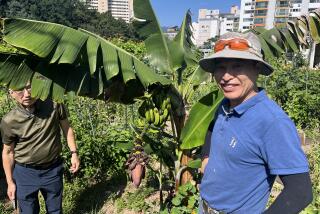Crackdown on Exotic Edibles Proves Indigestible
- Share via
SEOUL, South Korea — On routine coastline patrol, South Korean anti-smuggling officers stopped the fishing boat and found it carrying metal drums from China.
When they opened the barrels, they found each contained hundreds of live snakes in spaghetti-like tangles--writhing recipe ingredients destined for South Korean supper tables.
Snakes. Bear paws and bile. Dried lizards and centipedes. Reindeer antlers. Most South Koreans disdain the thought of eating them. But many others avidly seek such things for their purported medicinal properties.
South Korea officially bans the sale of “foods deemed unsightly,” but exotic reptiles, insects and animal parts are still smuggled in. Koreans also go on organized tours to Thailand, China and the Philippines to sample such fare, customs officials say.
Conservationists say endangered species like bears and tigers are threatened with extinction because of extensive hunting by poachers who cash in on the demand for animal parts in South Korea, Taiwan, Hong Kong and China and their expatriate communities worldwide.
“This is disgraceful. It jeopardizes the reputation of the whole nation,” said Yoon Hyong-ju, an official in the Health and Welfare Ministry. “Some Koreans must change their concepts on what they should eat and what they shouldn’t.”
South Korea retains deep respect for tradition and does not always welcome outside criticism of its culture, including the practice of eating dog meat. But the nation was scandalized recently when Thai tourism officials asked South Korea to warn its nationals not to visit Thailand to dine on bear.
The Washington-based wildlife protection group Investigative Network later said that South Koreans are the world’s biggest consumers of bear parts.
While South Korean officials say they are trying to halt the illegal trade in protected wildlife, “there is little evidence that any real measures have been taken,” the group charged.
Five South Korean tourists were arrested in early July in Thailand after police discovered 24 bear paws and bear entrails in their van during a traffic stop. The parts were apparently destined for the cooking pot, to serve as a special food reputedly good for increasing strength and vitality.
“The nation faces a big humiliation,” the newspaper Joong-Ang Ilbo said in a commentary on the arrests.
“Ugly Koreans Abroad,” another newspaper headline lamented.
Amid the public uproar, prosecutors said they were investigating credit card accounts of thousands of tourists and would punish any found to have spent excessive amounts on exotic animal eating tours overseas. Koreans are barred from spending more than $5,000 on their credit cards while abroad.
The government also is discussing stripping passports from Korean tourists who taint the national image.
Despite rapid political and economic changes that introduced Western concepts, many South Koreans still prefer traditional medicine using herbs or animal parts to Western-style medicine.
As in some other Asian cultures, Koreans consider bear gallbladders a cure for ailments from toothache to epilepsy.
Smuggled North American, Russian and Chinese bear gall is sold under the counter in tiny doses worth more, gram for gram, than cocaine. Bear-claw soup is considered a delicacy worth hundreds of dollars a bowl.
Wild bears are extinct in South Korea, although the National Forestry Administration estimates that 1,350 Asian bears are in captivity. News reports say that despite a ban on selling bear parts, captive bears are slaughtered secretly and sold for up to $62,000 each.
In the 1980s, South Korea began cleaning its streets of restaurants specializing in dog meat and other foods that could offend Western sensibilities during international events like the 1988 Summer Olympics in Seoul.
The law banning “unsightly foods” carries a penalty of up to one year in jail and a fine of $3,700. But the definition of an unsightly food is left up to municipal authorities, and the law is seldom enforced.
In the back alleys of Seoul, specialty shops still sell snake soups and other purported tonic foods. On weekends, some wealthy Koreans drive to the suburbs to drink fresh deer blood, which is believed to increase vitality.
The West and Koreans part ways on dog meat.
Koreans believe dog meat enhances stamina in men. On hot humid summer days, office workers in white shirts and ties crowd restaurants in Seoul to eat dog meat--euphemistically called “tonic soups” or “bowwow soups.”
International animal rights activists are threatening to boycott South Korean goods and try to disrupt Seoul’s role as host for soccer’s 2002 World Cup if the killing of dogs for meat persists.
But South Koreans don’t seem ready to give in on this issue.
“Just as they [foreigners] cherish their own culture, they should also honor other people’s culture,” anthropologist Chun Kyong-soo of Seoul National University wrote in a magazine column defending Korea’s dog-eating practice. “Only then can they call themselves civilized people.”
More to Read
Sign up for Essential California
The most important California stories and recommendations in your inbox every morning.
You may occasionally receive promotional content from the Los Angeles Times.










